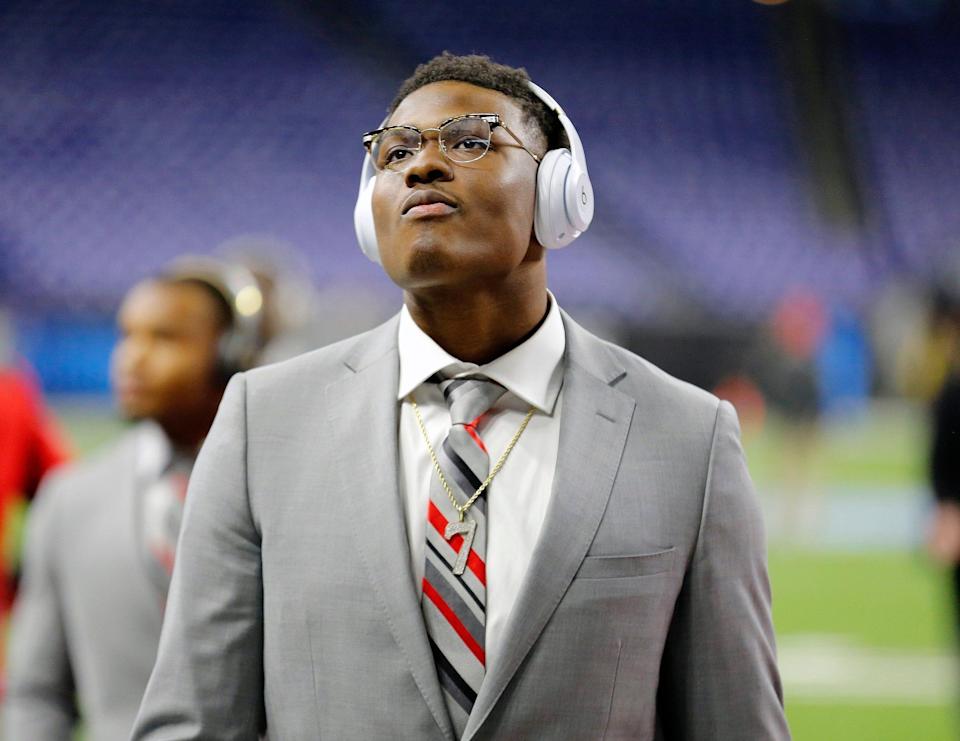By now, you’ve likely heard about the death of NFL player Dwayne Haskins, who was killed on Saturday after being hit by a dump truck in South Florida. He was only 24. His death was tragic enough, but what happened in the moments afterward was ugly, infuriating and said a great deal about how many people in and around the NFL dehumanize players.
There was an outpouring of grief for Haskins, but there was one reaction that caused massive outrage. It was from longtime NFL executive Gil Brandt, who won a Super Bowl with the Cowboys and is in the Pro Football Hall of Fame.
Brandt was asked about Haskins on SiriusXM’s NFL radio show and blamed the fact that Haskins left school early for the NFL for why he died.
The three main comments from Brandt:
— “He was a guy that was living to be dead.”
— “It was always something,” with Haskins.
— “Maybe if he stayed in school a year he wouldn’t do silly things [like] jogging on a highway.”
Brandt later apologized on Twitter, saying: “This morning while learning of Dwayne Haskins’ passing, I reacted carelessly and insensitively on a radio interview. I want to apologize to Mr. Haskins’ family and anyone who heard my poor choice of words. I truly apologize. My heart goes out to his family at this difficult time.”
It’s a fair question to ask: Why not just ignore what Brandt said? But his comments aren’t just the ramblings of someone who is 90 years old and should be, and likely will be, fired. The apology was needed but doesn’t change the fact that Brandt represents a significant swath of NFL culture, both inside and outside the sport, including segments of the media, and he wasn’t rambling. Brandt is a Hall of Fame executive who spoke the quiet part out loud.


(One thing people aren’t talking about is that during that train-wreck interview, the hosts didn’t stop Brandt, or interrupt him, or bother to admonish him.)
The NFL, for decades, has been in the dehumanization business. A large part of the league office, team executives, coaches and others see players as cogs and drones. The players aren’t human beings with blood running through their veins. They don’t have families. They don’t smile or experience pain. The head trauma they face is something to be buried or covered up. They’re a slot on a draft board. A fantasy pick. They are a collapsed body on the television screen who is scooped up as quickly as possible because the game has got to go on.
MORE: Sports world reacts to death of quarterback Dwayne Haskins
MORE: ‘A beautiful kid.’ Urban Meyer heartbroken over death of former Buckeye Dwayne Haskins
How else do you explain the league’s use of race-norming, one of the most despicable things the NFL has ever done? Or when teams at the combine ask players demeaning questions, like, was your mother a prostitute?
How else do you explain the NFL owner who compared players to inmates?
This story reminded me of when Dr. Bennet Omalu first diagnosed CTE and how he was basically shunned by the NFL. That’s because acknowledging Omalu meant the league would have to accept the humanity of its players. But many in the league can’t do that. Won’t do that.
The former team doctor for the Steelers, Dr. Julian Bailes, showed Omalu’s work to the league at a so-called “concussion summit.”
“They didn’t say, ‘Thanks, Doc, that’s great.’ They got mad at me,” Bailes said in an interview with GQ in 2009. “We got into it. And I’m thinking, ‘This is a new disease in America’s most popular sport, and how are its leaders responding? Alienate the scientist who found it? Refuse to accept the science coming from him?’ “
In many ways, the NFL culture reflects society. The past four or five years has seen a parade of goons using the dehumanization of others, especially people of color and the LGTBQ community, to achieve political power. The country’s been QAnon’d and conspiracy theory-d to the point where our care for each other has waned.
It’s the boiling frog theory. As the cruelty increases, we’re initially shocked, but the levels of cruelty and harsh language remain at high levels, and we all become accustomed to it. Pretty soon, we’re all unaware of the scalding water around us.
Yes, Brandt isn’t alone, both in terms of the NFL culture and the American one. We’re at the point where Haskins, who died tragically and was by all accounts a good man, was immediately excoriated as some sort of lifelong troublemaker “who was living to be dead.” Whatever that means.
Even the dead are dehumanized. Even the dead.
This article originally appeared on USA TODAY: Gil Brandt’s Dwayne Haskins comments show how players are dehumanized
